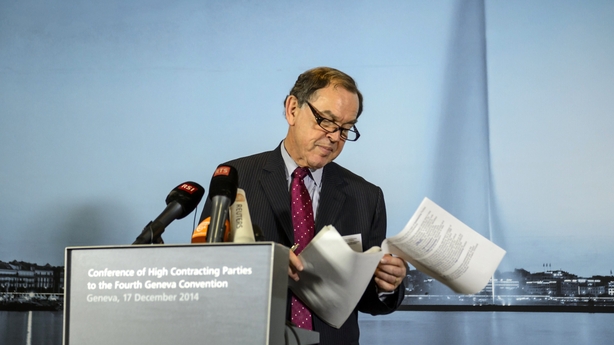The Palestinian Islamist group Hamas should be removed from the European Union's terrorist list, an EU court has ruled.
It said the decision to include it on the terrorist list was based on media reports and not considered analysis.
However, in its ruling, the bloc's second highest tribunal, the General Court of the European Union, said EU member states could maintain their freeze on Hamas's assets for three months to give time for further review or to appeal the verdict.
Israeli Prime Minister Benjamin Netanyahu said that Europeans appear to have learned nothing from the Holocaust following the ruling.
"In Luxemburg the European court removed Hamas from the list of terrorist organisations, Hamas that has committed countless war crimes and countless terror acts," Mr Netanyahu's office quoted him as saying.
"It seems that too many in Europe, on whose soil six million Jews were slaughtered, have learned nothing."
"But we in Israel, we've learned. We'll continue to defend our people and our state against the forces of terror and tyranny and hypocrisy," he said at the start of a meeting with US Republican Senator-elect Joni Ernst.
Hamas holds sway in Gaza and its founding charter calls for the destruction of Israel.
It has regularly clashed with Israel, most recently in a 50-day war this summer.
Most Western countries, including the United States, agree with Israel that it is a terror organisation, pointing to indiscriminate rocket strikes out of Gaza and waves of suicide attacks, primarily between 1993 and 2005.
Hamas says it is a legitimate resistance movement and contested the European Union's decision in 2001 to include it on the EU terrorist list.
It welcomed today's verdict.
"The decision is a correction of a historical mistake the European Union had made," Deputy Hamas chief Moussa Abu Marzouk said.
"Hamas is a resistance movement and it has a natural right according to all international laws and standards to resist the occupation," Mr Marzouk said.
The EU court did not consider the merits of whether Hamas should be classified as a terror group, but reviewed the original decision-making process.
This, it said, did not include the considered opinion of competent authorities, but rather relied on media and internet reports.
"The court stresses that those annulments, on fundamental procedural grounds, do not imply any substantive assessment of the question of the classification of Hamas as a terrorist group," the court said in a statement.
It added that if an appeal was brought before the EU's top court, the European Court of Justice, the freeze of Hamas funds should continue until the legal process was complete.
Appeals, which can only be based on points of law, may be brought within two months.
The appeal itself would typically last about a year-and-a-half.
Israeli Economy Minister Naftali Bennett called the ruling immoral.
"Israel is strong and can defend itself against its enemies, but those who will suffer from strengthening terrorist groups will be the Europeans themselves," he said.

Meanwhile, Israel has called an international conference held in Geneva, which has called on both sides in the conflict to respect humanitarian right laws in the occupied territories, a "political exercise".
Diplomats from 126 of the 196 signatories of the Geneva Convention met to discuss protections for civilians at the request of the UN General Assembly.
The US and Israel shunned the talks amid growing hostility, warning that the event threatened Switzerland's role as a neutral arbiter.
The conference ended in a ten-point declaration condemning Israel's actions in the occupied territories and also reminding both sides of the protracted conflict of their obligations to protect civilians.
Paul Fivat, Switzerland's special ambassador for the Geneva Conventions, said the intention was "not to accuse, it was not a tribunal ... it was a place simply for the parties to reiterate what is international law".
"This declaration is a signal that is being sent to conflicting parties, especially the civilian populations, that there is a law which is protecting their interests," he told reporters.
However, the Israeli foreign ministry said the talks undermined international law and "confers legitimacy on terrorist organisations and dictatorial regimes wherever they are".

